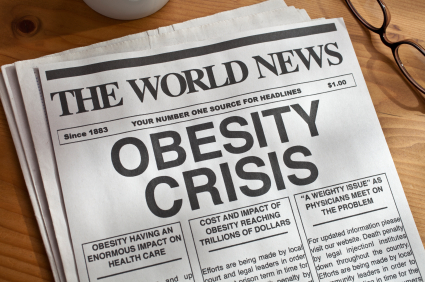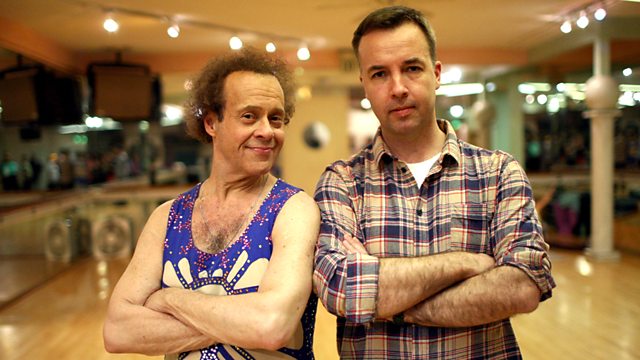Jacques Perretti's 2011 BBC documentary series, The Men Who Made Us Fat, whisked back the curtain to reveal big business and governments lurking behind today's low-fat dogma – and the accompanying obesity epidemic. We take a look at the first two episodes of the follow-up, The Men Who Made Us Thin.

The great obesity pincer movement
It's hard to escape the conclusion, after watching two episodes of The Men Who Made Us Thin, that we are hemmed in. On the one side, we have industry making enormous amounts of cash by making us fat and unhealthy, while on the other side we have the same industries making enormous amounts of cash by pretending to help us lose weight. Both sides are supported by government advice. Although by no means perfect, we thoroughly recommend that viewers get on board with this series.
The day that half of Americans became overweight
Louis Dublin was head statistician at the USA's largest insurance company, Metropolitan Life, in the 1940s. As he analysed reams of data to determine his customers' insurance premiums, he eventually came to a shocking realisation: that overweight was intimately linked with the risk of early death. After applying his concept of the 'ideal' weight for 25-year-olds to the rest of the population, he concluded that around 50% of the population of the USA was overweight. The US medical establishment and government alike picked up Dublin's baton and ran with it enthusiastically – despite the complete lack of supporting scientific evidence.
The birth of the diet industry
The Men Who Made Us Thin is full of these vinegary little anecdotes, even if, from a scientific standpoint, it’s thin gruel to those with a seasoned interest in diet and nutrition. For example, Perretti drew a line between Dublin's statistics and the vast diet industry of 2013, an era when, “Everyone wants to be thin,” yet 35% of adults over 20 are overweight and 11% are obese. Perretti placed Christian Dior's New Look centre-stage for the 17-inch waistline demanded by its 'hourglass silhouette' – thus opening the door for products like Metrecal to offer the tantalising prospect of the perfect figure, as defined by the fashion industry and adland. Big business was, as ever, on hand to offer phony solutions to problems of its own creation.
The business of starvation
It seems pretty clear, from the first two episodes, that one of Perretti’s main aims with The Men Who Made Us Thin was to shatter viewers’ preconceptions that either the diet or slimming industries are based on ‘science’. In episode one, for example, Prof Jules Hirsch of Rockefeller University explained how the overweight or obese brain panics when weight is lost: “It was impossible, seemingly, for [dieters] to keep the weight down, because the psyche of human starvation sets in at that point. It makes them seek techniques to return to what they were before.” Here, then, is one of the key explanations both for why the vast majority of diets fail and why the diet industry is so successful: diets may work in the short term, but the weight comes back eventually – and people just keep coming back for more.
On the treadmill to riches
In episode two, we are treated to a sergeant major-esque gym instructor exhorting lycra-clad spinners to submit themselves to 5 hours per week of “intense exercise” in pursuit of the body beautiful. Cue Perretti: “Is exercise an effective way of losing weight?” he asked of Prof Terry Wilkin, of Peninsula Medical School in Plymouth. “I think not,” replied Prof Wilkin drily. “Your ability to use exercise to burn the calories that would make a difference is very limited...No animal, for survival reasons, would ever unnecessarily expend physical activity”. Once again, burying this simple truth under oceans of vanity-stroking propaganda works wonders for the fitness industry, presently worth around £3.8 billion/year in the UK.
Too much width, too little depth
However, while it was great to see the founding myths of the bloated (pun intended) diet and fitness industries punctured, there’s an essential superficiality at the heart of The Men Who Made Us Thin. While more scientifically based diets, such as the carbohydrate-restricting Atkins and Dukan diets were both covered, albeit mostly negatively, we were surprised that the increasingly popular 'paleo' diet wasn't even mentioned. It may, of course, crop up later in the series. And many people probably didn't need the first episode’s 60 minutes to tell them that the diet industry is largely built on false promises.
As for the second episode, we’d have appreciated a deeper focus on the science behind the relationship between exercise and weight loss; one is left asking, “Well, if exercise doesn’t reduce weight, how come athletes are so buff?” Perretti has nothing to say on ‘training zones’, where heart rate is used to tailor exercise intensity according to the desired end. And what about high intensity interval training (HIIT)? Perretti’s conclusions were just too simplistic, even given the time limitations, but we enthusiastically applaud the programme’s emphasis on exercise as essential for health.
Enter villain, stage left
Much of episode two was devoted to the pharmaceutical industry’s pursuit of what a grinning analyst described as, “A magic bullet...the best thing since sliced bread”: a successful weight-loss drug. With potential profits in the order of £4–10 trillion, it’s no wonder pharma eyes are shining greenly. Unfortunately for pharma, it hasn’t had much luck so far. Of around 20 such drugs clinically tested, only one – Orlistat, marketed as Xenical by Roche in the USA and by GlaxoSmithKline (GSK) as Alli in the UK – remains on the market. Its mechanism of action prevents fat digestion through partial inactivation of lipase enzymes. Adult nappy, anyone?
Pharma’s desperation for success has been reflected in the scandals that have regularly engulfed the sector. GSK was fined a record $3 billion in 2012 for mis-selling a raft of drugs that included its weight-loss/antidepressant/smoking cessation offering, Wellbutrin (bupropion). Never approved in the US, Sanofi-Aventis’ Acomplia (rimonabant) was removed from the European market in 2009 for its association with severe psychiatric side effects. Rimonabant joined sibutramine, dexfenfluramine and fenfluramine on the list of anti-obesity drugs withdrawn from the market because of adverse side effects.
Looking forward
Mr Perretti has set himself a daunting task in The Men Who Made Us Thin, and for an admirably high percentage of the time, he hits the mark. We hope that the remaining two episodes will provide some more in-depth insights into the science behind obesity and metabolism, perhaps even touching on the idea of 'energy deficit'. We’re also very interested to know whether the interview with ANH-Intl founder and executive & scientific director, Robert Verkerk PhD, made the final cut!
The Men Who Made Us Thin is available to UK viewers on BBC iPlayer: Episode 1; Episode 2








Comments
your voice counts
26 August 2016 at 12:03 pm
your posted video is awesome i like it thanks for this post shear with us....
Your voice counts
We welcome your comments and are very interested in your point of view, but we ask that you keep them relevant to the article, that they be civil and without commercial links. All comments are moderated prior to being published. We reserve the right to edit or not publish comments that we consider abusive or offensive.
There is extra content here from a third party provider. You will be unable to see this content unless you agree to allow Content Cookies. Cookie Preferences